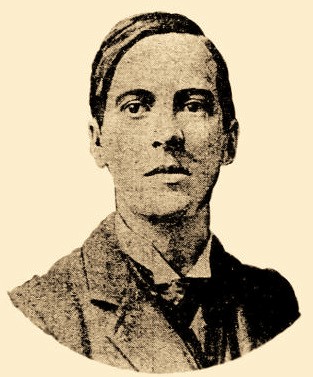
Edward Winter

From page 267 of Lasker’s Chess Magazine, April 1905:
‘Mr Pillsbury was operated on at the Presbyterian Hospital, Philadelphia on 27 March, and a few days later, while in a high fever, he tried to jump from a fourth story window. He was finally controlled and returned to bed.’
Or, as A. Bisguier and A. Soltis recounted the story on page 76 of American Chess Masters from Morphy to Fischer (New York, 1974):
‘… he tried to commit suicide by jumping from the fourth floor of a Philadelphia hospital where he was being treated for mental disorders.’
C.N.s 997, 1272 [for those two items see our feature article on Hugh Myers], 1608 and 1696 discussed this matter, and below we republish the contemporary accounts, beginning with two newspaper reports sent to us by Jeremy Gaige. The first comes from the (Philadelphia) Evening Bulletin of 31 March 1905, pages 1-2:
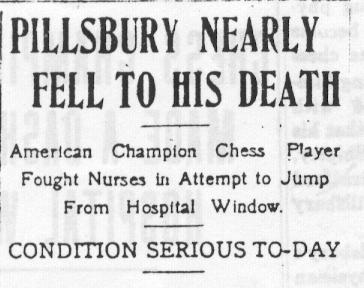
‘During a fit of temporary insanity Harry W. [sic; the photograph caption, moreover, gave ‘Henry N. Pillsbury’.] Pillsbury, the American champion chess player, tried to plunge through a fourth story window of the Presbyterian Hospital last night, and was overcome only after a desperate encounter with several nurses, doctors and hospital attachés.
One nurse, who arrived first on the scene on hearing the sound of breaking glass and seized [sic] the frenzied man, was felled to the floor. Only the arrival of reinforcements prevented a tragedy.
Unknown to many of his wide circle of acquaintances, Pillsbury has been a patient at the West Philadelphia Hospital since last Sunday, at which time he went there to have an operation performed. As he had been looking forward with eagerness to playing on the American team in the annual English-American cable chess match, which opens on 15 April, he was nervously anxious to recover as quickly as possible.
No one at the hospital today would discuss the subject of Pillsbury’s outbreak. All the attachés were instructed not to say a word to inquirers. It was even impossible to ascertain the condition of the famous chess expert, although early in the day an attaché said he was in a precarious state.
It is said that besides a few cuts from the glass in the window through which he tried to jump, Pillsbury was not marked, but it is believed the shock may prove disastrous as yesterday was the turning point in his condition following the operation.
Chess players were amazed today on hearing of the episode which almost took the life of one of the most brilliant players the game of chess has produced, the man who held the record of playing 28 simultaneous games [sic]. It was recalled in this connection that Steinitz, a famous player of his time, died in a mad house [sic], having been driven insane by the game to the mastery of which he had devoted his life.
A New Englander by birth, Pillsbury has been a resident of Philadelphia for about five years. He is about 33 years old, and made his home in the Atlantic Apartment House, at the N.E. corner of 11th and Winter sts., where he occupied rooms on the fourth floor with his wife, who was formerly Miss Bush, of Brooklyn. Mrs Pillsbury is a beautiful woman.
Dr Joseph T. Griffiths, a druggist at 11th and Vine sts., who knows the Pillsburys well, expressed the greatest surprise today when he heard the report of Pillsbury’s outbreak. He said:
“I was talking to Harry on Saturday, and he told me he was going out to the hospital the next day to be operated on. He said the doctors told him he would be out again in a few days, and he wouldn’t have to interfere with his chess engagements. His wife was with him at the time. I can’t believe he tried to kill himself unless he was out of his mind temporarily at the time. He was a nervous, excitable man.”
Out at the hospital no information on the case was to be had, but Superintendent Skeen, who was indignant that any news of the matter has leaked out, finally said: “There was no attempt at suicide and Mr Pillsbury in a spell of temporary insanity made a demonstration in his room. That’s all there was to it.”
From other sources it was learned that Pillsbury came to the hospital on Sunday and was operated on the next day. He occupied a room on the fourth floor, overlooking the corner of 39th and Filbert sts. He had a private male nurse. The operation was thought to be successful, and yesterday was the turning point of the patient’s condition.
About 7.30 o’clock last night those on the fourth floor of the hospital were startled by a sound of crashing glass and a nurse who had just been in Pillsbury’s room ran to that apartment. The chess player had broken the glass in the window with his fists and when the nurse appeared he was trying to force his way through the shattered pane. The nurse grabbed him by the legs, pulling him back, but Pillsbury, who evidently was not responsible for his actions, swung his arm around and knocked the nurse to the floor.
Two other nurses and an orderly arrived at this juncture and all seized the demented patient. Others arrived and there was a desperate encounter before Pillsbury, with the heruclanean [sic] strength of a man temporarily beside himself, gave his captors the struggle of their lives. But they finally overpowered him and sedatives were applied to quiet him. Beyond a few cuts Pillsbury was unmarked, but it was the shock of the outbreak and struggle that worried the caretakers.
Before Pillsbury had been quieted by sedatives administered hyperdermically he raved about chess in the wildest fashion. He called out moves in a game of his imagination and it was only with the greatest difficulty that he was finally quieted.
The outbreak created consternation in the ward outside of Pillsbury’s room. Several of the women patients screamed outright in their terror, and the nurses, who had been aiding in the subduing of Pillsbury, had to run to them to prevent a panic.
A later report of the matter had it that Pillsbury walked out of his room waving his arm wildly over his head and uttering chess movements [sic]. He entered the room of a woman patient and she, terrified, rang her bell for assistance, and her nurse responded at once. Pillsbury’s male nurse also arrived at this juncture and the two managed to drag the temporarily insane man back into his room. Then it was, according to this account, that Pillsbury broke away and tried to get through the window.
Henry [sic] Nelson Pillsbury is one of the most famous chess players of the world. Although he never technically [sic] won the world’s championship, now held by Emanuel Lasker, he has several times defeated the latter in tournament play and in offhand games. In blindfold play, however, his supremacy is unchallenged. Repeatedly he has engaged in 20 simultaneous contests without sight of boards or men, almost a dozen more than attempted by any other player [sic]. His greatest achievement at regular chess was the winning of the International Masters’ tournament at Hastings, Eng. in 1895, when among those who finished behind him were Lasker, Steinitz, Tarrasch, Chigorin, Schiffers, Teichmann and Bardeleben.’
The report closed with a brief account of the rest of Pillsbury’s chess career and this physical description of him:
‘In person Mr Pillsbury is of medium height, with an intellectual head and clean-cut, classic features. He has a kindly though exceedingly resolute disposition, and an incisive speech at once courteous and fearless. He is slight, with dark hair and smooth face.’
The second newspaper report provided to us by Mr Gaige was in the Philadelphia Inquirer of 1 April 1905, pages 1 and 4:
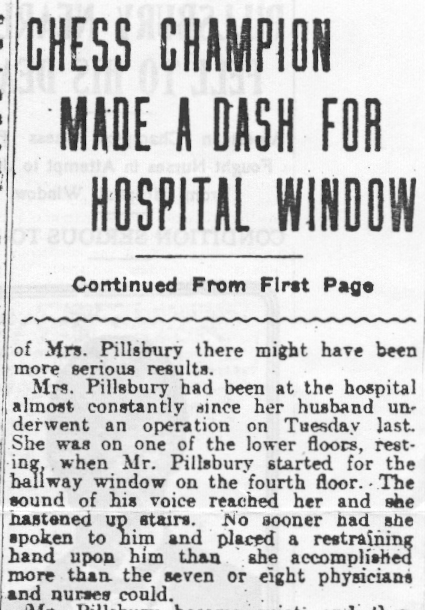
‘While critically ill as a result of a delicate operation, Henry [sic] Nelson Pillsbury, the American champion chess player, became temporarily insane on Thursday evening last at the Presbyterian Hospital.
While physicians and nurses were trying to prevent the crazed man from reaching a fourth-story window Mrs Pillsbury arrived, and at the sound of her voice her husband quieted down almost instantly. He permitted Mrs Pillsbury to lead him back to his bed, and yesterday was reported to be improving.
The first intimation the attending physician had that his patient had become irrational was when he entered the chess player’s room and found him dressing himself. The physician remonstrated with Mr Pillsbury, but the latter said that his friend, Attorney Walter Penn Shipley, was giving a ball at the Bellevue Stratford and that he had promised Mrs Pillsbury to take her there.
Perceiving at once that Mr Pillsbury’s mind was wandering, the physician humored him until the chess player finally agreed to abandon his idea to attend the imaginary ball and permitted himself to be undressed and put to bed again.
No sooner had he returned to bed than he informed the nurse in attendance upon him that he was burning up for want of water. She left the room to get him some water, and he followed her. She persuaded him to return to bed again until she brought him a glass of water. Then the chess player complained that the water was full of “strange creatures”.
The nurse, realizing that Mr Pillsbury’s condition was becoming more serious, summoned the physician who was looking after him. Together they persuaded him that the water was free of “strange creatures”, and he was about to drink it when he suddenly paused and demanded that he be permitted to draw the water himself. Suddenly he leaped from his bed, despite his weak condition, and succeeded in reaching the hallway, nurse and physician trying vainly to stop him.
Other physicians and nurses arrived and they surrounded Mr Pillsbury just as he was making for a window. They prevented him from reaching it, but he became violent, and but for the opportune arrival of Mrs Pillsbury there might have been more serious results.
Mrs Pillsbury had been at the hospital almost constantly since her husband underwent an operation on Tuesday last. She was on one of the lower floors, resting, when Mr Pillsbury started for the hallway window on the fourth floor. The sound of his voice reached her and she hastened up stairs. No sooner had she spoken to him and placed a restraining hand upon him than she accomplished more than the seven or eight physicians and nurses could.
Mr Pillsbury became quiet, and then he smiled as Mrs Pillsbury seized his hands and slowly led him back to his bed. Later he fell asleep and yesterday was apparently rational again, though extremely weak.
Mr Pillsbury has been in ill health for two or three years. Recently his condition prevented him from participating in chess tournaments, and this is believed to have caused him much worry. A New Englander by birth, Mr Pillsbury has resided in this city for five years. Mrs Pillsbury was formerly Miss Bush of Brooklyn. Mr Pillsbury was long a resident of Brooklyn and achieved distinction as a chess player when a member of the chess club of that city. He is a member of the Franklin Chess Club of this city.’
Such journalism was criticized on page 164 of the March 1905 American Chess Bulletin:
‘On 31 March the American press gave wide circulation to a story of attempted suicide on the part of Harry N. Pillsbury, emanating from Philadelphia, and it affords the Bulletin pleasure to lay the following concise statement on the subject, by president Walter Penn Shipley of the Franklin Chess Club, before its readers:
“The statement in the papers in reference to Mr Pillsbury’s condition have [sic] been grossly exaggerated. Mr Pillsbury entered the Presbyterian Hospital, one of the best institutions in Philadelphia, on 26 March, for a slight operation for a trouble from which he has been suffering for the past two years. There was nothing unusual in the trouble and the operation is one most customary in such cases. Dr Henry J. Wharton, one of the best surgeons in this city, performed the operation, which was entirely satisfactory, two days later, and Mr Pillsbury was expected to be around again in about a week.
His condition following the operation has been favorable, but as is usual in a case of this kind, his diet had to be for a few days restricted. As a result of the lack of nourishment and the effect of the ether, Mr Pillsbury had a delusion on the night of the 30th that he must be present at an entertainment given for him in Philadelphia, and that he must be on hand promptly. No doubt the entertainment that he had in mind was one that was given at the Franklin Chess Club about a week before, at which he was present. Pillsbury got up and dressed himself and started to leave the hospital, when he was interfered with by the nurses.
Thinking that the interference was unwarranted and being in a trance somewhat similar to a man that walks in his sleep, he did not see any reason why they should detain him and attempted to force his way out of the hospital. He was, however, aroused in the course of about half an hour, realized where he was and retired peacefully to bed. I saw Dr Wharton the next morning. His condition then was favorable and he was resting quietly. I believe, in the course of a week or ten days, he will be around and, after he recovers his strength, will be strong and well as he was three or four years ago. The statements that appeared in the papers are unwarranted and a gross outrage, both to Mr Pillsbury, his friends and the public. It is absolutely untrue that his wife was at the hospital, as set forth in the papers, and her remarks, as well as other supposed details, were manufactured by the reporters who wrote up the articles.”’
C.N. 11268 reproduced the full report as published on pages 1 and 4 of the Philadelphia Inquirer, 1 April 1905:

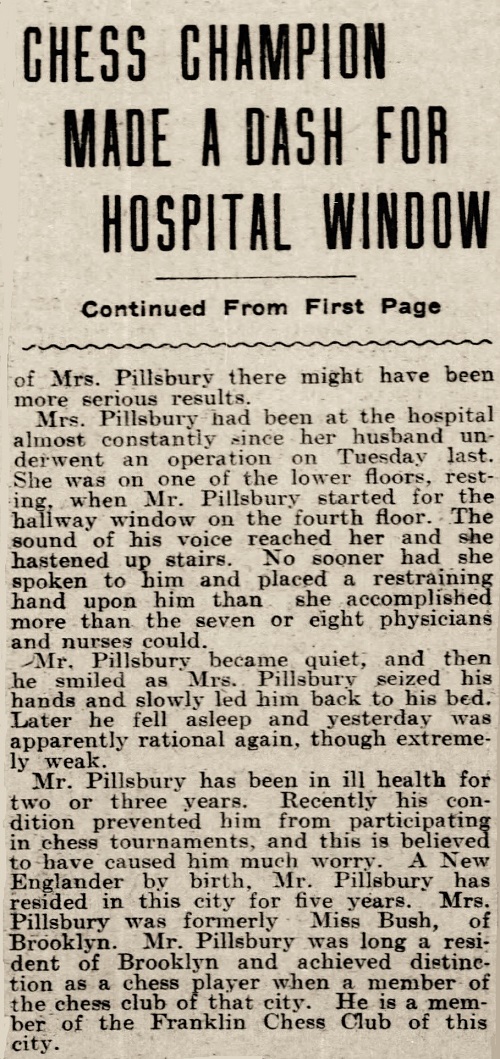
We are grateful to Neil Brennen for sending a further contemporary report on Pillsbury. It comes from The North American (Philadelphia), 1 April 1905, page 3:
‘PILLSBURY, OF CHESS FAME, TRIES MAD LEAP
Nurses, after desperate fight, prevent him from jumping through window
TEMPORARILY INSANE
Henry [sic] N. Pillsbury, the American chess champion, tried to jump from a fourth-story window of the Presbyterian Hospital early yesterday morning. He struck down one nurse and fought with several other attendants before he was overpowered and forced back to his bed.
It was said last night, and vigorously denied by his friends, that Pillsbury’s mind has become affected by the severe mental strain of his feats at chess, particularly the games in which he participated while blindfolded.
Pillsbury entered the hospital as a patient last Sunday, and was apparently then in possession of his full mental powers. An operation, the nature of which the hospital physicians would not divulge yesterday, was performed Monday, and since that time his condition has been somewhat unfavorable.
He was guarded night and day by a male nurse. Shortly after midnight yesterday the nurse left Pillsbury’s room for a short time. He was recalled hastily by the sound of heavy blows and crashing glass.
The patient had not thought to open the window, but had attacked it with a chair, demolishing pane and sash. When he saw the nurse returning he attempted to launch his body through the aperture. The nurse seized him and pulled him back into the room.
Then Pillsbury turned on the attendant in a frenzy and struck him to the floor, just as two other male nurses, a watchman and a doctor, who were attracted by the noise, ran into the room.
Fought Four Men
His muscles strengthened with the strange power of madness, the big chess player was almost a match for the four men. He battled with them for several minutes before he was forced down upon a bed in another room. Sedatives were administered.
Attendants at the hospital were very reticent yesterday concerning the matter. They said Superintendent Skeen had ordered them to say nothing about it. Skeen said the chess player did not try to commit suicide.
“In a fit of temporary insanity Mr Pillsbury caused a disturbance in his room by trying to jump out the window” was the way he explained it. Pillsbury’s condition was reported yesterday as much improved.
Not many of his friends knew that Pillsbury was a patient in the Presbyterian Hospital. He has been living with his wife in apartments at Eleventh and Winter streets, and inquiries there elicited merely the information that he was ill.
He was to have played on the American team of chess players who will compete with an English team in a match by cable, beginning 15 April.
His Brilliant Record
Few chess players have achieved the prominence that Pillsbury achieved by his brilliant victories over American and European masters of the game within the past ten years.
Although he has never been world’s champion, he has frequently beaten Emanuel Lasker, who now holds that title, both in tournament play and in off-hand games.
Pillsbury’s greatest achievement at chess was his winning of the International Masters’ Tournament at Hastings, England, in 1895, when Lasker, Steinitz, Tarrasch and all the other great players of the time were vanquished by the young American.
Pillsbury has lived in Philadelphia for several years.’
Afterword: The above accounts were given in C.N.s 2707 and 2723. In November 2005 (C.N. 4018) John Hilbert provided the following additional report from an unidentified contemporary newspaper:
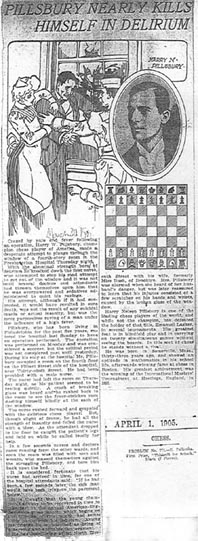
For a larger version, click here.
In C.N. 5158 Dr Hilbert drew attention to page 3 of the 9 April 1905 issue of the Washington Times, which had a news story about Pillsbury entitled ‘Tragic collapse of a brilliant mind’. The first paragraph reads:
‘When Harry Nelson Pillsbury, the American champion chessplayer, one time champion of the world, and probably the most marvelous trick chessplayer that ever lived, tried to commit suicide in Philadelphia during a fit of insanity a few days ago, he only fulfilled the fate which has been that of nearly all of the great masters of the game. The tremendous mental strain which they undergo in the great tournaments, aided and abetted by excessive use of stimulants to keep them keyed to the proper pitch, is too much for the human brain, no matter how abnormally brilliant.’
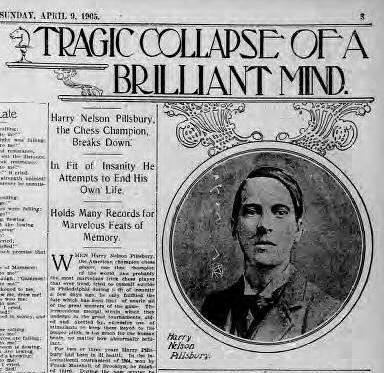
It seems to us that the photograph of Pillsbury in the Washington Times of 9 April 1905 (C.N. 5158) was inverted, and therefore a reversed copy is given here:
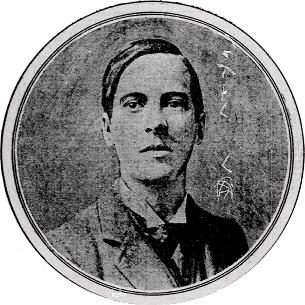
A further passage about Pillsbury in the Washington Times comes from page 6 of its edition of 26 June 1906, i.e. not long after he died:
‘Horse v Chessplayer
Our highly respected and entertaining contemporary, the Wall Street Journal, is in a parlous state because of the relative attention paid to the deaths of Pillsbury, the chess master, and Sysonby, the racehorse. It grieves especially because of the part journalism played in this discrimination, thus saying:
“The general newspapers give a column and a half and a ‘spread head’ on the first page to an account of the death of a great thoroughbred horse. They give a half column on an inside page to the death of America’s greatest chessplayer, of whom it is said he was ‘one of the mental marvels of the age’. Is a horse better than a man? Does brute strength possess more interest than mental power?”
Even newspapers have to take things as they find them in this world, and a newspaper man in dealing with events that he is to lay before the people must and does take into account the things that will be of most interest to his special public. The constituency of a few papers doubtless had greater concern about the passing of the brilliant chessplayer, but the large majority of readers everywhere felt the deeper interest in the horse. It may not be a very fine commentary on our national spirit, but it is a fact, nevertheless. And newspapers are less molders of public sentiment than they are molded by it.’
(5164)
Olimpiu G. Urcan (Singapore) draws attention to a report on pages 1 and 2 of the Boston Journal of 1 April 1905:
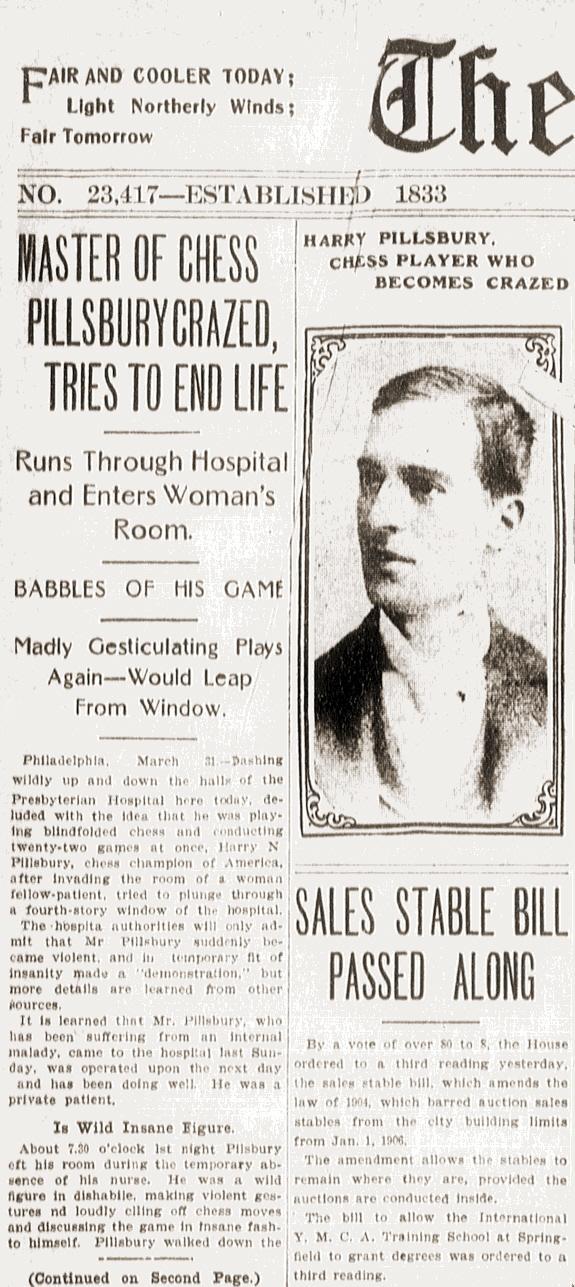
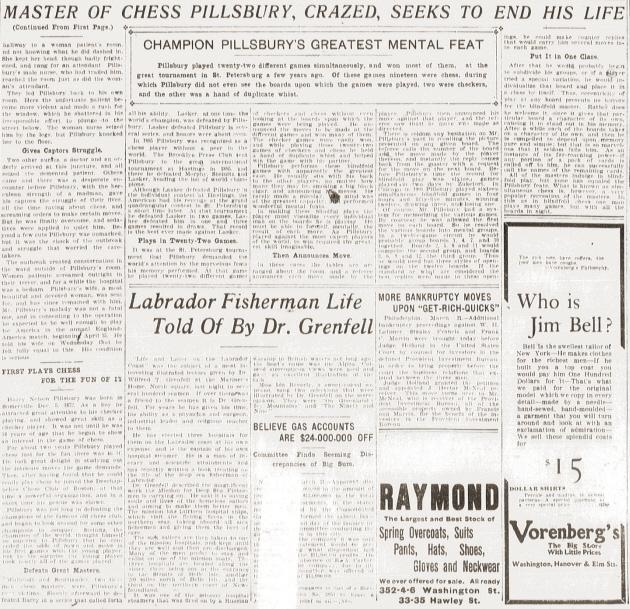
(7121)
Olimpiu G. Urcan has forwarded two further news reports:
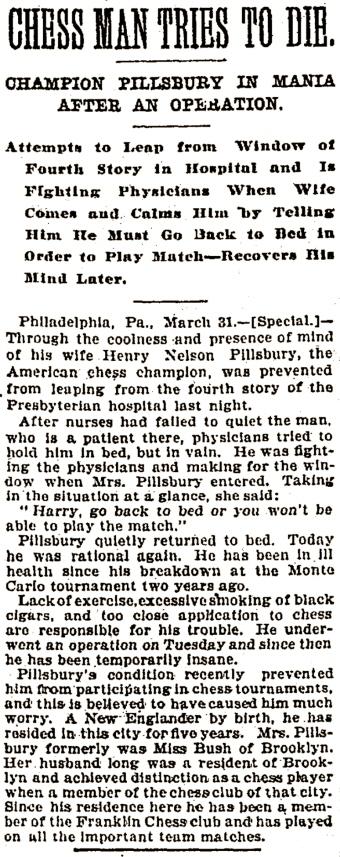
Chicago Daily Tribune, 1 April 1905, page 2
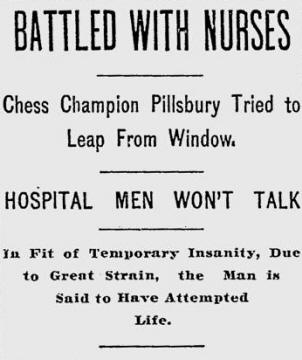
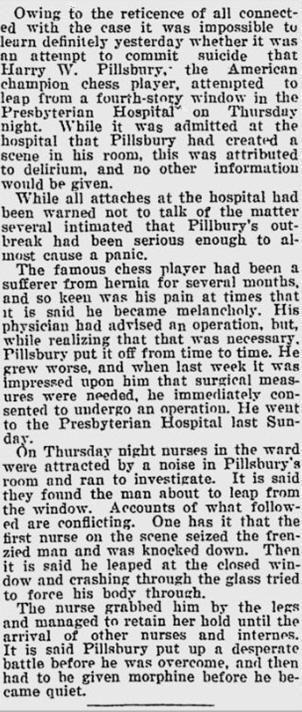
Philadelphia Record, 1 April 1905, page 10
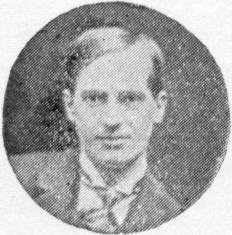
Harry Nelson Pillsbury
Scott D. Young (Crawfordville, FL, USA) asks:
‘Who was the first to print the cause of Pillsbury’s demise?’
In C.N. 342 a correspondent, W.D. Rubinstein, quoted from page 42 of A Catalog of USA Chess Personalia by Jeremy Gaige (Worcester, 1980) the following comments regarding Pillsbury:
‘... it should be noted that his death certificate said he died of “general paresis”, i.e. syphilis. I have found many other indications in Philadelphia that this was in fact the case, e.g. the scrapbooks of Walter Penn Shipley contained a typewritten obituary (presumably by Shipley himself) that said Pillsbury died of “general paresis”.’
In that same C.N. item W.D. Rubinstein quoted from a letter to him from Jeremy Gaige dated 27 October 1982:
‘I have no documentation on where he contracted syphilis. Interestingly, Friends Asylum still has the day-by-day log and medical records of Pillsbury, but strictly forbids any inspection of same. Tantalizingly, a hospital official read me a few innocuous sentences from the records, but that is all. I did have two indirect accounts that he did in fact contract the disease in St Petersburg (from Bill Ruth 1886-1975 and J. Edmund Peckover 1896-1982). Peckover said he was told that version by A.B. Hodges, who said he was told that by Pillsbury himself.’
When the word ‘syphilis’ was first used in connection with Pillsbury’s death we do not know. ‘Paresis’ appeared in his obituary on page 290 of the July 1906 BCM, but the context should be noted:
‘On his return to Philadelphia he was examined by the best medical experts, one of whom, Dr Charles K. Mills, a noted specialist of great repute in the United States, expressed the opinion that Mr Pillsbury’s affliction was not caused by his chessplaying, and this testimony was supported by Dr Chase, also an expert on the subject of paresis. The probability is that the real cause of the breakdown was irregularity in time of eating and sleeping, and the neglect of out-door exercise, together with excessive smoking.’
Readers are invited to submit further citations.
(4948)
Scott D. Young reverts to a matter which he raised in C.N. 4948: ‘Who was the first to print the cause of Pillsbury’s demise?’ The question remains open, but our correspondent notes that Dale Brandreth (Yorklyn, DE, USA) was spontaneously informed by two people that Pillsbury died of syphilis: by Bill Ruth in a telephone conversation circa 1968 and, some two years later, by Walter Penn Shipley (the son of the well-known chess figure of the same name).
It may be recalled that Walter Korn attempted to put a timetable on Pillsbury’s alleged contraction of the disease at St Petersburg 1895-96; see pages 70-74 of his book America’s Chess Heritage (New York, 1978).
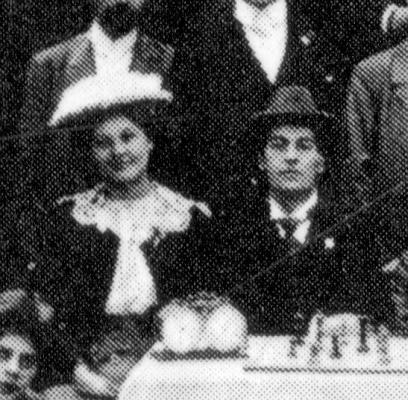
Hanover, 1902 (C.N. 4246)
Dr Brandreth also notes in this context that Pillsbury married in 1901 (see C.N. 4246). As mentioned in that item, we recall no references to Mary Ellen Bush after Pillsbury’s death in 1906. There is some hunting to be done regarding her later life.
(5576)
‘Great skill at chess is not a mark of greatness of intellect, but of a great intellect gone wrong.’
That remark is often quoted with inaccurate and incomplete information. For example, the following comes from page 1 of Chess to Enjoy by A. Soltis (New York, 1978):
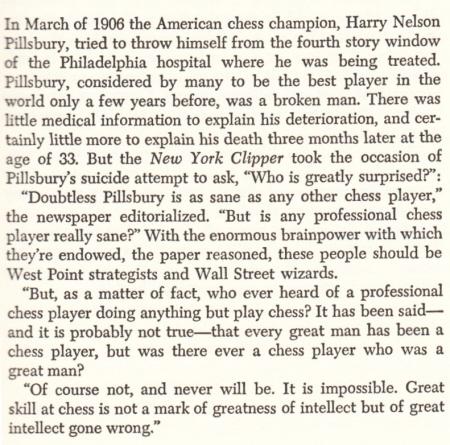
Churlish as it may seem to pass strictures upon Soltis when he gives a source of sorts, no date is attached to the New York Clipper, and the reference to Pillsbury in March 1906 is wrong. As has been shown, the master’s hospitalization in Philadelphia was in 1905.
From page 237 of Treasure Chess by B. Pandolfini (New York, 2007):
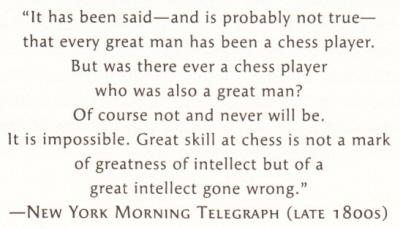
‘New York Morning Telegraph (late 1800s)’ may not be much of a source, but by Pandolfini’s standards it is chapter and verse. At first glance, moreover, it seems to improve, however vaguely, on what was on page 7 of Chess Quotations from the Masters by Henry Hunvald (Mount Vernon, 1972):
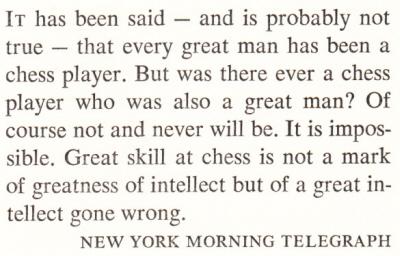
The text appeared on page 4 of the New York Sunday Telegraph, 2 April 1905:
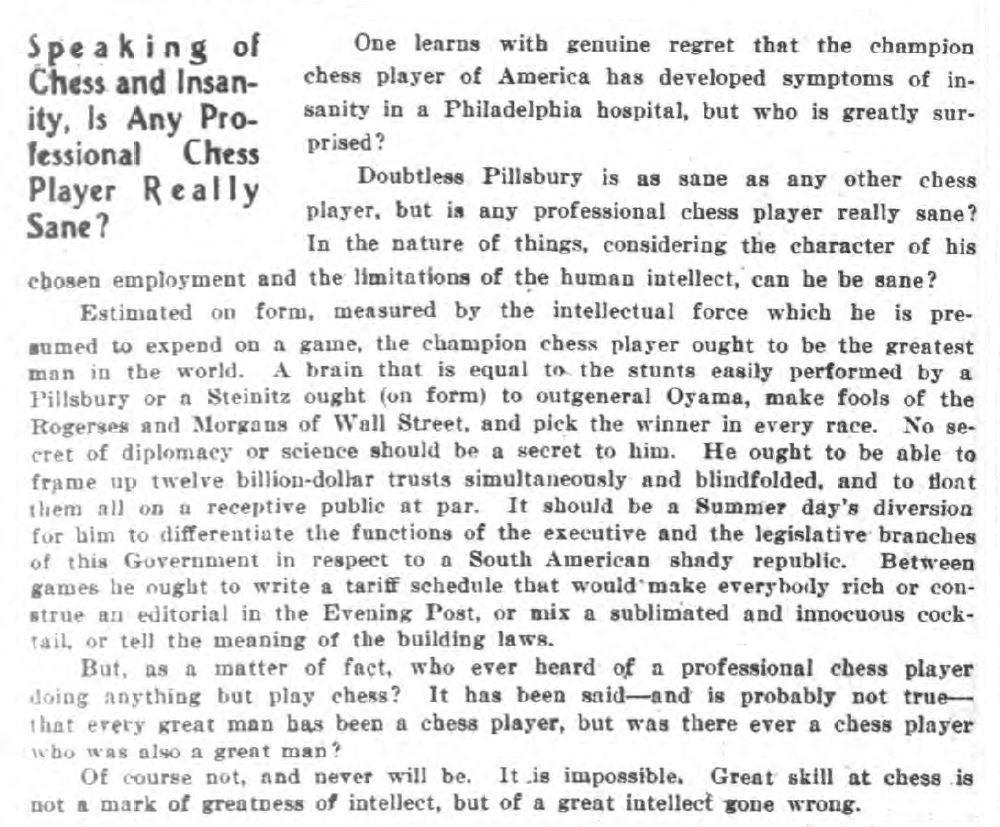
The article/editorial was quoted on pages 267-268 of Lasker’s Chess Magazine, April 1905, and the final part was reproduced by Eliot Hearst on page 255 of the September 1961 Chess Life. Both provided the exact date of the newspaper, identifying it by its more general title, the New York Morning Telegraph.
(8359)
See too our general article Harry Nelson Pillsbury.
To the Chess Notes main page.
To the Archives for other feature articles.
Copyright: Edward Winter. All rights reserved.